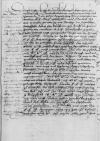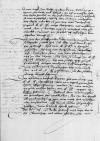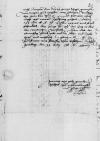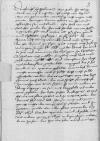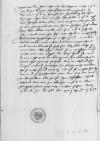Wir haben den XVIII thag Iunii vorgangen von ⌊Breslaw⌋ E(wer) F(urstlichen) Durch(lauch)t ⌊⌋, / und so der briff beÿ uns vorlossen, / hab wir in von ⌊Streltza⌋ im oppelschen hertzogthum durch eÿn kauffman gen ⌊Dantzke⌋ an herrn(n) ⌊Hansen von Werdenn⌋ E(wer) F(urstliche) D(urchlauch)t zuvorschaffen / gegeben. / So der vileicht nicht wer geantwurt, / hab wir des dy copeÿ hier zugelegt, / daraus in der kurtze, / wÿ umb alles(s), / E(wer) F(urstliche) D(urchlauch)t sych wirt haben zuberichtenn(n). / Dieweÿl wir dan in gedachtem brive zugesagt, / das wir mit guther musze weÿtlofftiger(r) wolden schreÿbenn(n), / wollen paper damaged⌈[n]n paper damaged⌉ wir E(wer) D(urchlauch)t nicht vorhalden, / das wir der gestaldt mit ⌊ro(mische)r ko(nigliche)r m(aieste)t⌋, wÿ dÿ copeÿ mit bringt, / und vil weitlofftiger(r) mit den herrn rethenn, / dÿ uns in der handlung zugegebenn, / geredt habenn / und alles angetzeÿgt, / so dÿ acht nicht vordgelegt und superinscribed⌈undund superinscribed⌉ zur execucion kweme, / was args und beÿderleÿ seÿthen schadens, / ferlicheit, / auch christlichs blutvorgissen doraus mocht erwachssenn. / Das der meÿnung wol von uns angenhomen(n) / und ⌊ro(mische)r ko(nigliche)r m(aieste)t⌋ angetragen, / uns auch mit solchem antwurt, / wÿ ro(misch)e ko(niglich)e m(aieste)t gegeben, / gedachte rethe begegnett, / doraus E(wer) F(urstliche) D(urchlauch)t wol hat zu ermessen, / das dÿse wÿchtige sache nicht so gering von ⌊kay(serliche)r m(aieste)t⌋ und im ⌊reich⌋ werd angesehenn(n), / so dergestaldt ro(misch)e ko(niglich)e m(aieste)t wirdt irer zusage, / wÿ wir nicht anders hoffen, / werde nachghen, / domit diss wesen / an zweÿffel / ein stÿlstandt wirt gewinnen, / und duncket uns nicht, das E(wer) F(urstliche) D(urchlauch)t derwegen sych vil habe zu besorge(n). Wÿ dan auch ⌊ko(niglich)e m(aieste)t⌋, unser aller gene(digs)t(e)r herr,  GStA PK, HBA, C1, No 512 1v do wir negst im ⌊rathe⌋ underandren / relacion gethann, / beruret / und bekent, / ir m(aieste)t vorgessen hett, das dyser handel in dy instruction, uns zugeschickt, / so wer eingesetzt, / thrug aber sondren wolgefaln, das dÿser artickel so von uns wer vortgestalt, / sagend, E(wer) F(urstliche) D(urchlauch)t muge derhalben wol unbekummert sein, / welchs uns in warheÿt auch gut duncket, / wiwol ein freuntlich uffsehen kein schaden brengt etc.
GStA PK, HBA, C1, No 512 1v do wir negst im ⌊rathe⌋ underandren / relacion gethann, / beruret / und bekent, / ir m(aieste)t vorgessen hett, das dyser handel in dy instruction, uns zugeschickt, / so wer eingesetzt, / thrug aber sondren wolgefaln, das dÿser artickel so von uns wer vortgestalt, / sagend, E(wer) F(urstliche) D(urchlauch)t muge derhalben wol unbekummert sein, / welchs uns in warheÿt auch gut duncket, / wiwol ein freuntlich uffsehen kein schaden brengt etc.
Wy wir den 1538-07-15⌊funfftzenden dits monts1538-07-15⌋ in guter gesuntheÿtt, / Gott hab lob, ehr und danck, / ⌊hie⌋ her gelangt, / hab wir E(wer) F(urstliche) D(urchlauch)t II hengste gefunden, / dÿ uns mit dem ledren sathelln(n) / fast angenhem sein, / mit dem erbiethenn(n), / wÿ in der copeÿ, / das wir so lange in E(wer) D(urchlauch)t schuldt bleÿbenn, / bis wir solche hohe gunst freuntlich mugen vordynen und vorgelthen(n). / Was widerumb dergleichen beÿ uns wirdt sein und E(wer) F(urstliche) D(urchlauch)t gefallenn, / sol der selbten alweg bereÿt sthenn etc.
Den erbarn ⌊Cristoff Rippen⌋ hab wir auch, / wÿ E(wer) F(urstliche) D(urchlauch)t ⌊⌋ von uns begert, / gerne zum dyner uffgenhomen. / Wollen in, / wor wir im vil guts wissen thun, / von E(wer) D(urchlauch)t wegen befolhen habenn(n), / byttend, / dem stalmeÿster(r) ein genediger her wolde sein, / der in der hengst uberantworthung gen uns nicht hat vorsehen ader vorsewmet. / Es komet alles zu guthen zeÿthen, was freunde hande geben etc.
Beÿ ⌊ko(nigliche)r m(aieste)t⌋ zu ⌊Krako⌋, / habend mit uns bis in dÿ newntzig / mit allen / pferden, / sey wir  GStA, PK, HBA, C 1, No 512, f. 2r nicht lenger(r), dan dreÿ gantze thage gewesen. Wir tragen gut wÿssen, was langer vortzog beÿ hove kan thun etc. Do hab wir auch nicht vÿl newer(r) zeÿthung gehort, / alleine wÿ nun E(wer) F(urstliche) D(urchlauch)t wÿssen, / wÿwol umb fried gehandelt, / das ⌊junge ko(niglich)e m(aieste)t⌋ den zcog wider(r) den ⌊Walachen⌋ vortsteldt, / dem Gott der almechtig gluck gebe und der selen und leÿbs heÿl und wolfarth, / der gleichen E(wer) F(urstlichen) D(urchlauch)t, der gunst wir uns fleissig thun befelhen. /
GStA, PK, HBA, C 1, No 512, f. 2r nicht lenger(r), dan dreÿ gantze thage gewesen. Wir tragen gut wÿssen, was langer vortzog beÿ hove kan thun etc. Do hab wir auch nicht vÿl newer(r) zeÿthung gehort, / alleine wÿ nun E(wer) F(urstliche) D(urchlauch)t wÿssen, / wÿwol umb fried gehandelt, / das ⌊junge ko(niglich)e m(aieste)t⌋ den zcog wider(r) den ⌊Walachen⌋ vortsteldt, / dem Gott der almechtig gluck gebe und der selen und leÿbs heÿl und wolfarth, / der gleichen E(wer) F(urstlichen) D(urchlauch)t, der gunst wir uns fleissig thun befelhen. /
 GStA PK, HBA, C1, No 512 1v do wir negst im
GStA PK, HBA, C1, No 512 1v do wir negst im  GStA, PK, HBA, C 1, No 512, f. 2r nicht lenger(r), dan dreÿ gantze thage gewesen. Wir tragen gut wÿssen, was langer vortzog beÿ hove kan thun etc. Do hab wir auch nicht vÿl newer(r) zeÿthung gehort, / alleine wÿ nun E(wer) F(urstliche) D(urchlauch)t wÿssen, / wÿwol umb fried gehandelt, / das
GStA, PK, HBA, C 1, No 512, f. 2r nicht lenger(r), dan dreÿ gantze thage gewesen. Wir tragen gut wÿssen, was langer vortzog beÿ hove kan thun etc. Do hab wir auch nicht vÿl newer(r) zeÿthung gehort, / alleine wÿ nun E(wer) F(urstliche) D(urchlauch)t wÿssen, / wÿwol umb fried gehandelt, / das 